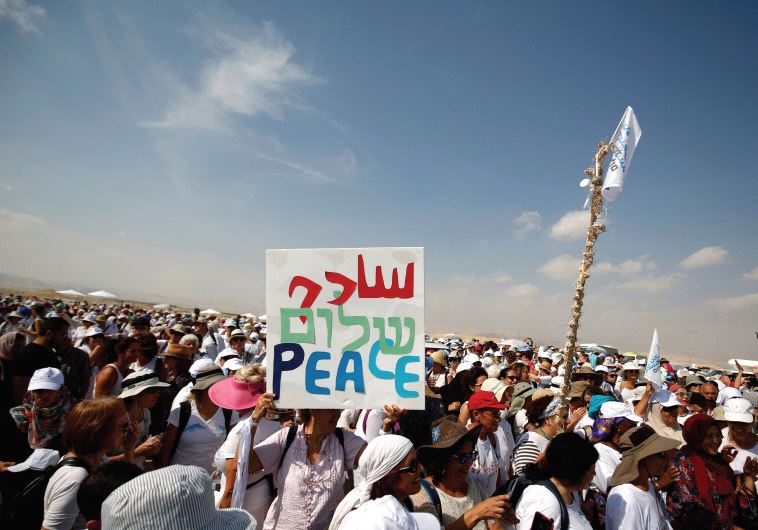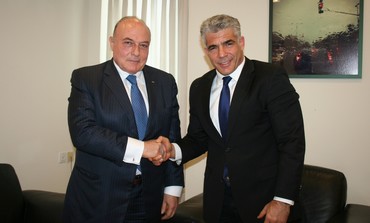Whatever solution you support to the Israeli-Palestinian conflict: one state, two states, three states, 10 states, federation, confederation or even if you believe that there is no solution to the conflict – the starting point for changing the nature of relations between the two conflicting peoples is beginning to relate to each other as neighbors.
We, Israelis and Palestinians, need a reset in our relations. It is impossible to wipe out the past and we all have plenty of reasons not to trust the other side. Many of us have real reasons to fear the other side and some of us even have very good reasons to hate the other side. One fact of reality must impress upon us all that we must face: We are not leaving – Israelis and Palestinians will not abandon this land. Millions of us are here, more or less in equal numbers on this narrow land between the River and the Sea. All of its hills, valleys, coast lines and coastal waters are dear to us. We define ourselves by our connection to this land and we claim to give our identity to this land. But let’s face it, a large part of the beauty and the magic of this land is the presence of both people on it and the great diversity within all of the communities who call this land their home. So, if we all love and cherish this place, we all feel that we belong here and that this land belongs to us, we are all staying and committed to live on this land and to care for it for future generations, then we have to push the reset button on our relations to start to reach out to change the nature of our interactions so that eventually we can return to the negotiating table in good faith to reach agreements on how to share this land.
The reset should be launched with making available corona vaccines for everyone who lives between the River and the Sea. Israel claims to have an excess of vaccines purchased from all of the various manufacturers. Not only is making the vaccines available to Palestinians the moral thing to do, it is also the right thing to do from an epidemiological point of view. The coronavirus does not stop at checkpoints and return back to the Palestinian areas. Viruses don’t recognize borders and Israel has essential control over all of the area between the River and the Sea. It doesn’t matter that the Oslo agreement gave healthcare in the Palestinian areas to the Palestinian Authority. If Israel has enough vaccines to go around, then the first priority must be to share them with our immediate neighbors. We shouldn’t even need to think about this – it is something that we should do because the Palestinians are our neighbors and we want to have good and healthy neighbors.
Once the reset is in motion, there are many other things that we can do to change the way that we relate to each other. We should return to the pre-Second Intifada policy of allowing Palestinian vehicles to enter Israel – with the required security checks necessary, as was done in the past. Palestinians with security clearances should be allowed to come back to Israel to go to the sea, or to tour around the country, or to shop or to eat in a restaurant. Those permits should not be limited to those who work in Israeli factories, or on Israeli farms or those who build Israeli homes. It is also time to reopen Palestinian areas for Israeli civilians to enter.
Many Israelis already illegally enter Palestinian areas. They should be allowed to enter legally, to shop, to tour, to eat in restaurants, to visit old and new friends. We need to return to see each other as human beings. Let it be clear, I am not suggesting that we normalize the occupation and the status quo. I am also not suggesting that we create situations which endanger our security (for both sides). I am proposing a path for resetting the way that we view each other so that we can get back to being able to sit down at the table to discuss and agree on a future which will be much better for all of us.
Today we live by suspicion, fear and hatred. We will never be able to return to the negotiating table until we begin to trust that both sides want to live in peace. Compromises must be made based on the belief that both sides have the intention to implement what they will agree upon. That was not the case even after two years of Oslo. Breaches of the agreements on both sides came one after the other, and with that the understanding that both sides had no genuine intention to implement the obligations they took upon themselves in the agreements that they negotiated and signed. Since then, the working assumption on both sides of the conflict has been that the other side cannot be trusted. When that is the working assumption, there is no point to even negotiating. That is what has guided us all for too long.
THE BEST way to break this horrible cycle of no-trust would be a dramatic political act of the Sadat type. But neither Israel nor Palestine has those kinds of leaders. Perhaps after elections on both sides something will emerge on the political scene that will make a difference. It seems unlikely but we can still hope. In the absence of the grand statesman, we can set a course for mutually beneficial and assuring steps that can gradually change the political environment between the two sides.
There are many more steps that Israel can take that can impact the lives of Palestinians than what Palestinian can do. That is the nature of our situation because Israel is in control of many aspects of Palestinian reality. There are many things that Israel can do that will open the Palestinian economy and make it easier for Palestinians to develop businesses.
Many of these issues concern movement and access including importing and exporting procedures. There are aspects of previous agreements that were canceled with the outset of the Second Intifada – for example, the removal of Palestinian Authority presence at the Allenby-King Hussein Bridge between the West Bank and Jordan. We can return to that agreement and build on the cooperation which can transform that border crossing into a major artery of commerce between Israel, Palestine, Jordan and the Gulf countries.
There is a lot that can be done to improve the cooperation between Israeli and Palestine banks returning and improving the processes for managing money transfers for commerce and joint venture investments, locally and internationally. There is much that can be done to improve the availability of water and electricity and the conversion of fossil fuel-based energy into renewable energy. The possible areas of cooperation are vast; so many of them have been neglected and stored away in the archives of the long-forgotten peace process. We need to take them out of storage and begin to create a new reality.


